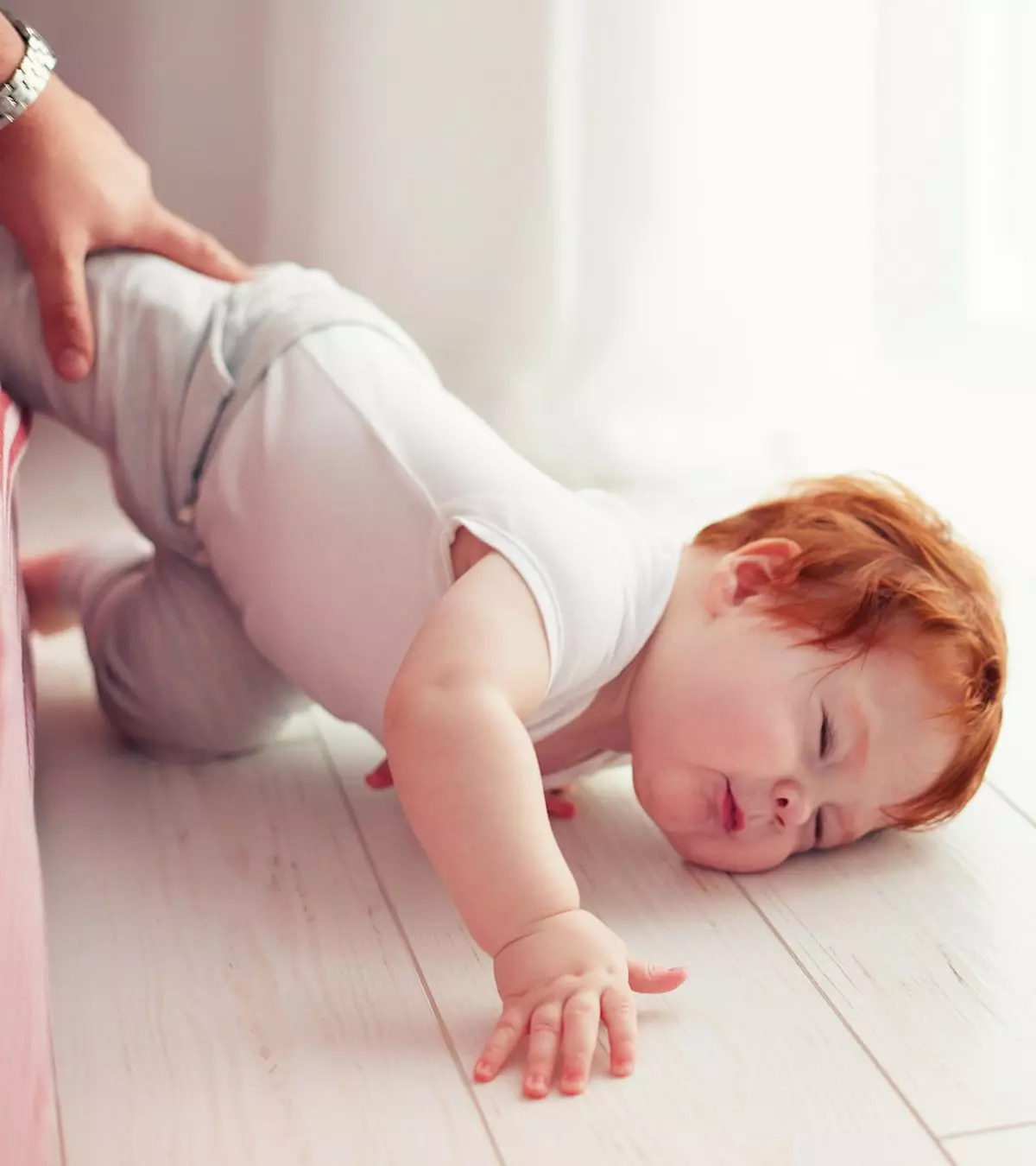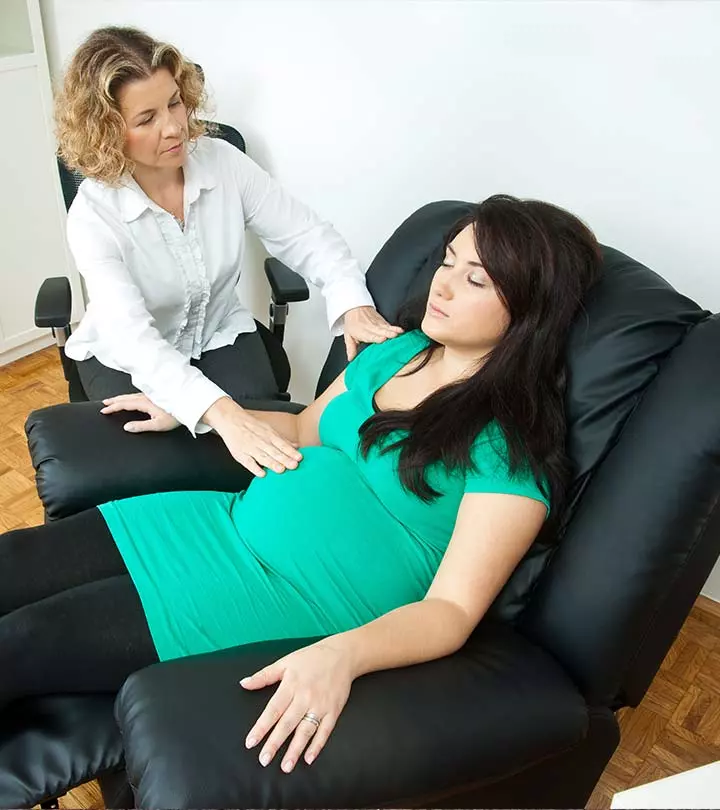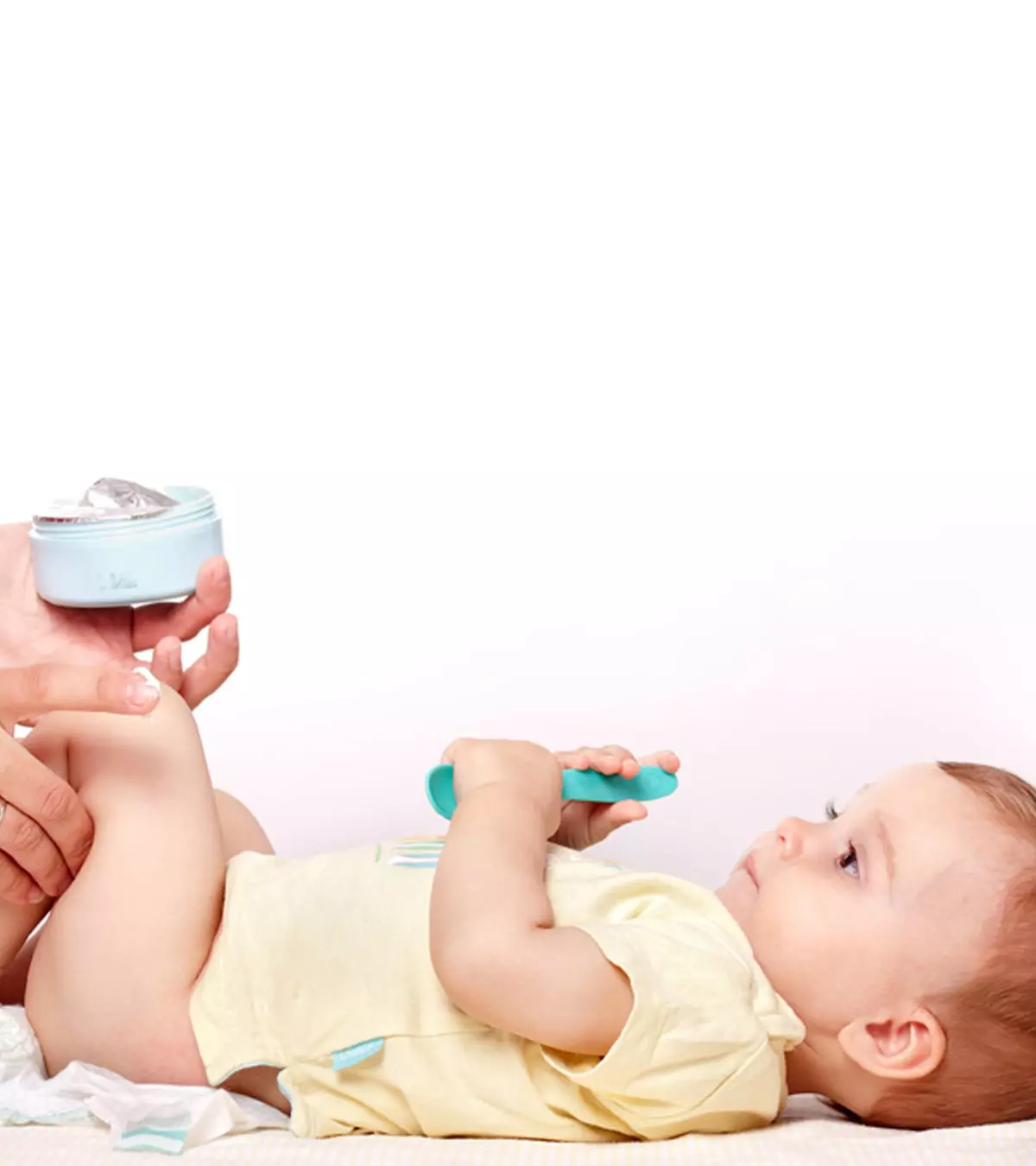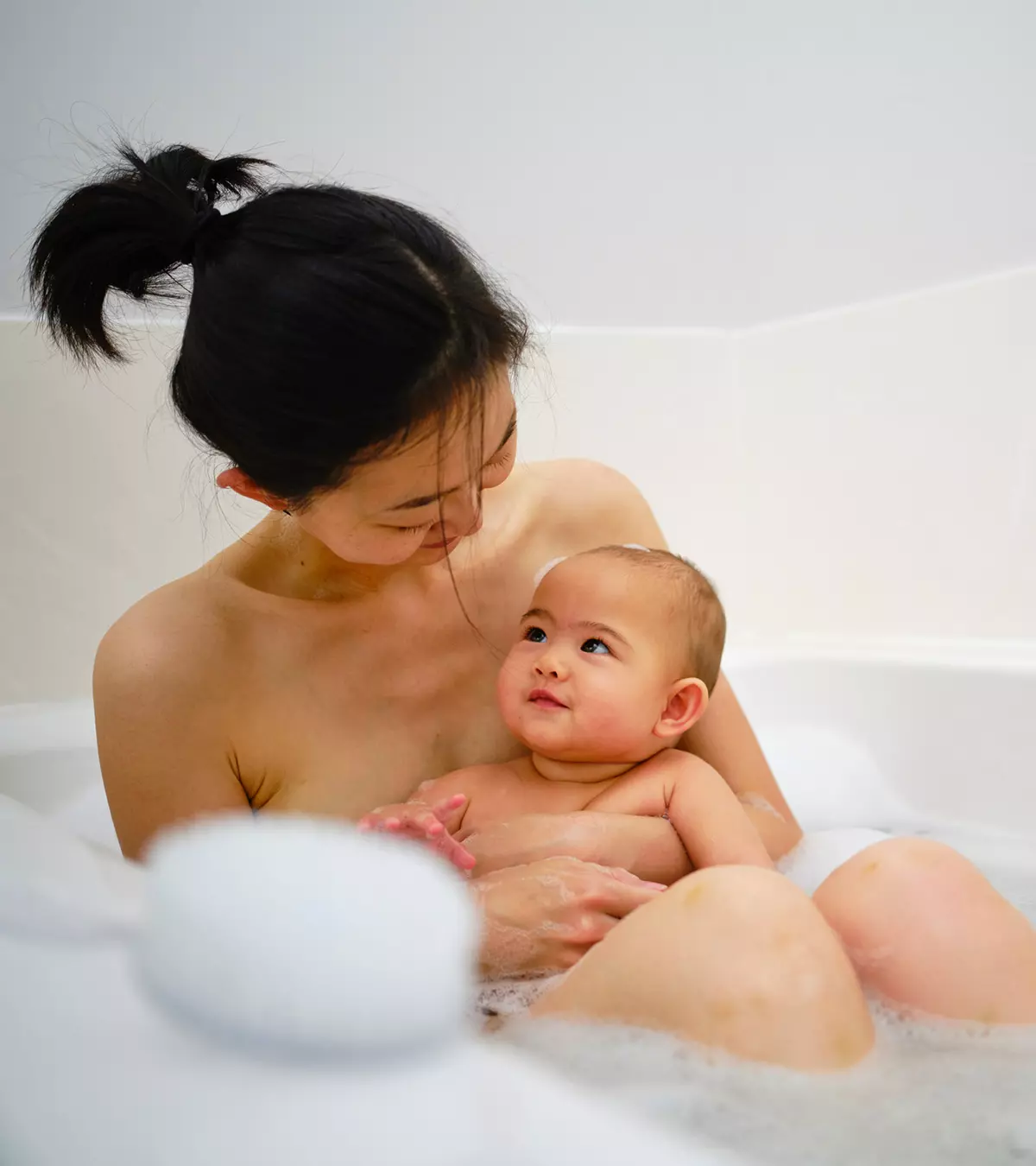
Image: MomJunction Design Team
While some babies like to bath, bath time is a cry fest for many. In such scenarios, mothers may wonder if showering with a baby is safe or not. Showering with their baby may be preferred by many mothers as it comforts the child and saves some of their precious time. Since babies want to be in the comfort of their mother’s arms all the time, bath time with moms around can be a pleasant experience. Read this post to learn about the safety tips and precautionary measures to keep in mind while taking a shower with your baby.

Key Pointers
- Slipping of the baby, irritation from bath products, divided attention are some concerns while having a shower together.
- Spreading a shower mat on the floor, wearing shower gloves, keeping the water lukewarm, etc., are some precautions when co-showering.
- Avoid showering with your baby if you use bath products unsafe for a baby, your baby dislikes showers, or during periods.
Is It Safe To Shower With A Baby?
Showering with the baby is safe, provided you observe all the safety precautions. Babies are usually best bathed in a tub where the water is stagnant, and you have better control at manipulating the infant. . When you and the baby are in the shower, you may find it difficult to hold the baby. However, there could be other issues, too.
Concerns About Showering With A Baby
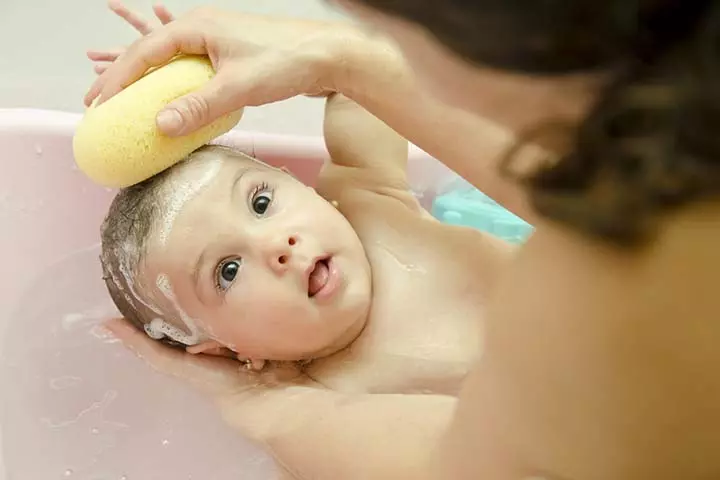
The following are the likely issues that could arise while showering with your baby.
- Increased risk of slipping while holding the baby
- Difficulty in holding the baby firmly
- Divided attention between bathing yourself and the baby
- Uncertainty about correct way of cleaning the baby under the shower
- Shower products irritating the baby
Precautions To Take When Co-showering
If you choose to shower with your baby, prepare yourself to keep the experience safe for yourself and the baby. The following precautions could make showering with a baby safe.
- Shower mat: Before you head to the bathroom, place a grippy shower mat on your bathroom floor. The shower floor can get slippery after a shower, and a shower mat helps prevent accidental slips.
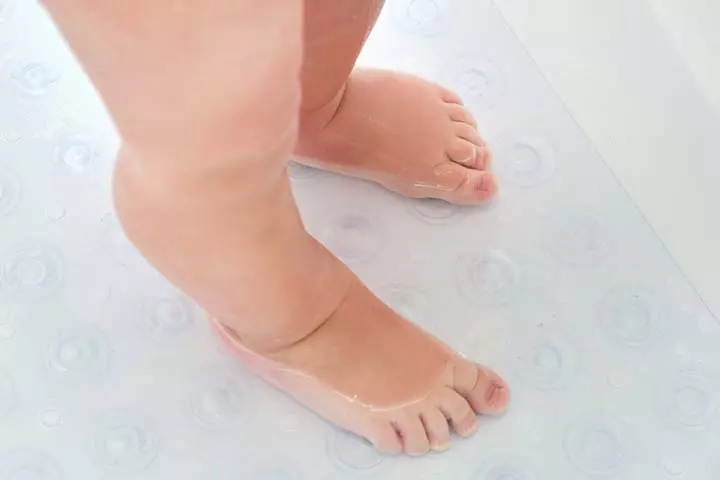
- Shower gloves: You could consider wearing shower gloves, which could provide you a better grip while holding the wet baby.
 Quick tip
Quick tip- Shower products: While co-showering, stick to using baby-friendly products for yourself and the baby. Using your bathing products, such as shampoo, could cause the baby to come in contact with the lather, which may irritate their skin. Choose products that are gentle and convenient to use. For instance, prefer using a baby shower gel, which can be dispensed through a bottle with a pump. It provides easier single-handed access to the product. Make sure you have the baby’s and your own shower products and towels next to you in the bathroom, so that you don’t have to leave the baby unattended in water to fetch those products at the last moment.
- Shower water: You may prefer a hot shower, but your baby’s skin is too sensitive for it. Use only lukewarm water or maintain an appropriate newborn baby bath temperature when having a bath with your baby.

- Baby seat or bath tub: Use a baby seat or baby bathtub made of sturdy plastic material and place it on the stable bathroom floor. If your baby can sit, then you may consider using a mini seat. These provide a place to put your baby when needed. Among infants under one-year-old, two-thirds of all drownings occur in bathtubs, as per a CDC report. Remember to place one hand on the baby so that they do not lose balance while seated.
- Shower towels: Keep separate towels handy for once you are done with the bath. To maintain hygiene, it is vital not to share your towel with the baby. Babies get uncomfortable when once their head and hair get drenched. It’s best to rinse their head/hair at the last and then immediately wrap their whole body in a hooded towel.
- Partner support: If you are not a single parent, you can always take your partner’s help. For instance, your partner’s hands would be dry, and they can wipe the baby with a towel after the shower. Never leave a baby unattended in the shower or bath area or near water.
Remember to keep all the supplies, such as baby’s shower gel and shower gloves, handy before you begin bathing to prevent searching for them during a shower. For added convenience, you may keep baby products such as lotion or powder readily available for quick use after showering.
How Often Can You Shower With The Baby?
A newborn baby need not shower daily as a regular sponge bath is enough for them. If you feel they need a shower, you can bathe with them once or twice a week. You must only begin bathing once the baby’s umbilical cord stump dries and falls off, which is between one and two weeks of age (1). Give your baby sponge baths until then.
Once the baby becomes older and reaches toddlerhood, you may bathe them more frequently. Speak to a pediatrician to know the ideal frequency of bathing for your baby’s age.
When Should You Avoid Showering With The Baby?
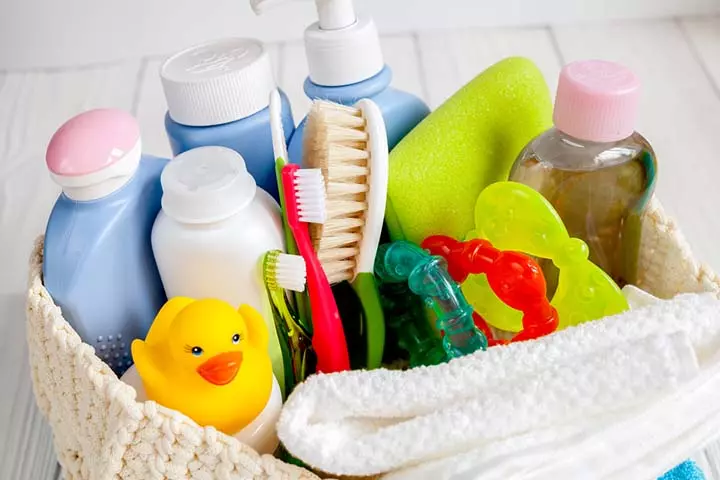
There are certain situations in which showering with your baby is best avoided.
- Baby has the habit of pooping or peeing during bath
- You require specialized bathing products that are unsafe for baby
- Baby dislikes the shower
- The shower flow is too harsh for the baby’s skin
- During your periods
If you are uncomfortable with the idea of showering with your baby, then do not force yourself to do it.
 Quick tip
Quick tipWhat If You Do Not Wish To Shower With The Baby?

It is okay to not be interested in showering with the baby. Many parents consider showering with the baby out of convenience, especially when they are a single parent and cannot leave the baby alone. You may consider the following alternatives to co-showering.
- You can bathe the baby the conventional way in a bathtub. Bathing in a tub also makes for good playtime for the baby.
- If you are a single parent, then you may place the baby in their crib for a nap before taking your shower.
- You may adjust your shower timings so that you take a shower at a time when your baby is most likely to be asleep in their crib and would not notice your absence. However, it is important to prioritize proper safety and care for your baby while you take a shower.
Frequently Asked Questions
1. What should I do with my baby while I shower?
It is best to ask some other adult to supervise the baby when you shower. If no other adult is supervising the baby, you may take a quick shower when they are napping in their bassinet or crib. If you have a baby monitor, take the monitor with you and keep an eye while you shower to ensure they are doing fine.
2. When can I start showering with my baby?
You may start showering with your baby once the umbilical cord falls off and you are comfortable and confident in holding them and balancing yourself. Ensure the water is warm, not hot, there is no direct stream of water on their face, the bathroom is tidy, and it does not have mold (2). However, checking with the pediatrician before you shower with your baby is advisable.
3. How do I shower my baby without her crying?
Baby crying during the shower does not mean that your baby hates baths. The baby could be uncomfortable with the timing of the bath. You could try the following tips to ensure that your baby is not crying in the shower-
- Ensure your baby is well-fed before shower time
- Engage with songs and conversations
- Check the temperature of the water, ensuring it’s neither too hot nor cold
- Stick to a particular routine
4. What are the signs that my baby is uncomfortable in the shower?
Signs of discomfort in the shower include crying, arching of the back, or attempting to move away from the water. These reactions may indicate your baby feels overwhelmed or distressed by the water flow, temperature, or sensation. If you notice these signs, consider switching to a traditional bath where your baby may feel more secure and relaxed.
You may choose to shower with your baby by choice or due to convenience since you cannot leave your baby alone. Either way, it is a fun experience that allows you to spend some precious time together. As long as you follow the necessary precautionary measures such as using an anti-slip mat, baby-safe products, and bathing with lukewarm water, showering with a baby is safe. However, if it is difficult for you, do not force it. Instead, try other methods such as bathing them in a tub or letting them sleep while you shower to avoid any unwanted outcomes.
Infographic: Benefits Of Showering With The Baby
When done after taking necessary precautions, bathing with your little one could be more than just a joyful experience. Skim through this infographic to learn the benefits of showering with your baby.
Some thing wrong with infographic shortcode. please verify shortcode syntax
Illustration: Showering With Baby: How To Do Safety And Precautions

Image: Stable Diffusion/MomJunction Design Team
References
1. Bathing Your Baby; American Academy of Pediatrics
2. Bathing a newborn; Raising Children Network (Australia) Limited
Community Experiences
Join the conversation and become a part of our nurturing community! Share your stories, experiences, and insights to connect with fellow parents.
Read full bio of Pranjul Tandon
Read full bio of Rohit Garoo
Read full bio of Dr. Ritika Shah
Read full bio of Ghazia Shah








